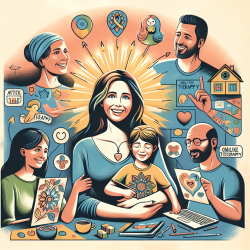The COVID-19 pandemic has had a profound impact on the mental health of families, particularly those with children who have developmental disabilities. A recent study titled "Maternal well-being and family adaptation during COVID-19 in fragile X syndrome" sheds light on this issue, offering critical insights for practitioners in the field of speech-language pathology. This blog will discuss key findings from the study and how practitioners can implement these insights to improve outcomes for families.
Understanding the Impact
The study found that mothers of children with fragile X syndrome (FXS) experienced elevated levels of anxiety and depression during the COVID-19 pandemic. This increase was significantly higher compared to their pre-pandemic mental health status. Specifically, 77% of mothers reported worsening anxiety, and 55% reported worsening depression.
Sources of Stress
The study identified several sources of stress that contributed to the decline in maternal well-being:
- Social Isolation: 58% of mothers reported that the lack of social interaction for their children was a significant source of distress.
- Disruption of Routine: 31% of mothers indicated that disruptions in their children's routines were moderately difficult to manage.
- Reduced Access to Services: Nearly 90% of families reported disruptions in educational services, and many cited a lack of access to therapeutic and recreational activities.
Positive Adaptations
Despite these challenges, some families found ways to adapt positively to the pandemic. Key positive adaptations included:
- Increased Family Togetherness: 36% of mothers reported that spending more time together as a family was a positive outcome.
- Health Improvements: 11% of mothers noted improvements in family health, including better eating habits and increased exercise.
- Child Adaptation: 17% of mothers reported that their children adapted well to remote learning and other changes.
Recommendations for Practitioners
Given these findings, practitioners can take several steps to support families better:
- Enhance Social Support: Facilitate virtual support groups and community interactions to mitigate social isolation.
- Maintain Routines: Help families establish and maintain routines, even in a remote or hybrid learning environment.
- Increase Access to Services: Advocate for the continuation and expansion of online therapy services to ensure families have the support they need.
- Promote Resilience: Encourage families to focus on positive adaptations and resilience-building activities.
Encouraging Further Research
While this study provides valuable insights, it also highlights the need for further research to understand better the long-term impacts of the pandemic on families with children with developmental disabilities. Practitioners are encouraged to stay informed about ongoing research and to contribute to this body of knowledge through their practice and observations.To read the original research paper, please follow this link:
Maternal well-being and family adaptation during COVID-19 in fragile X syndrome.










